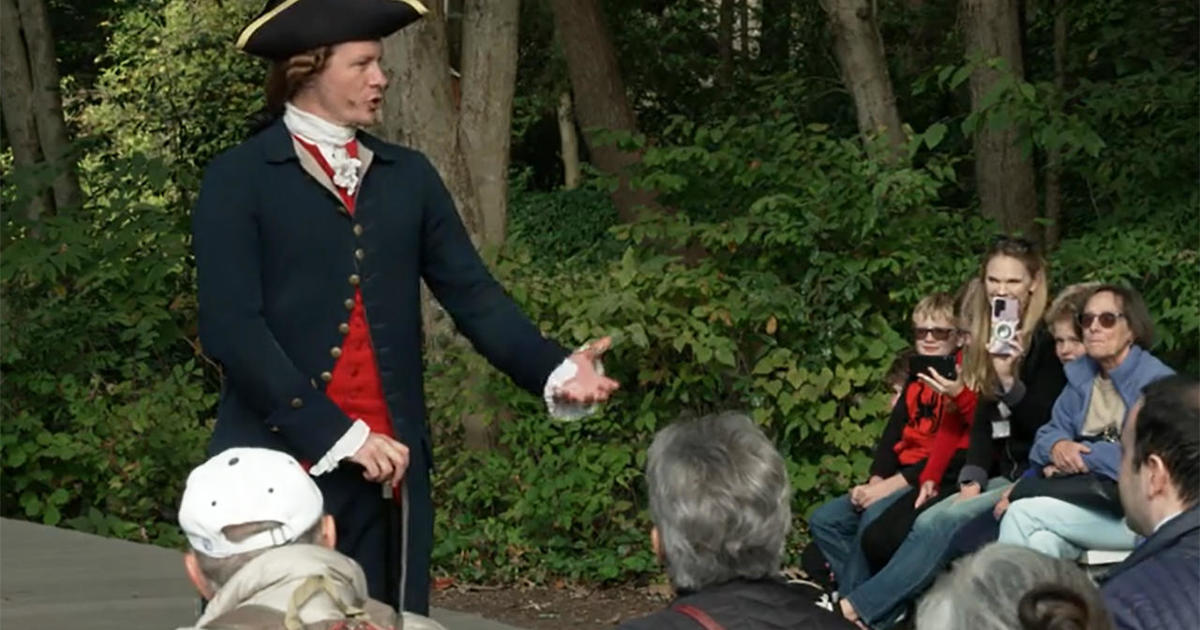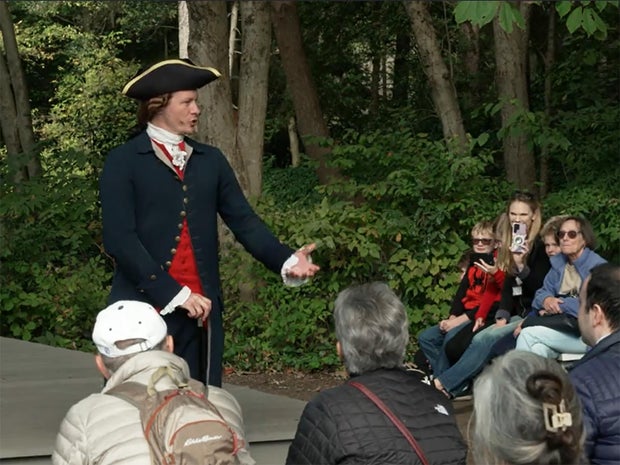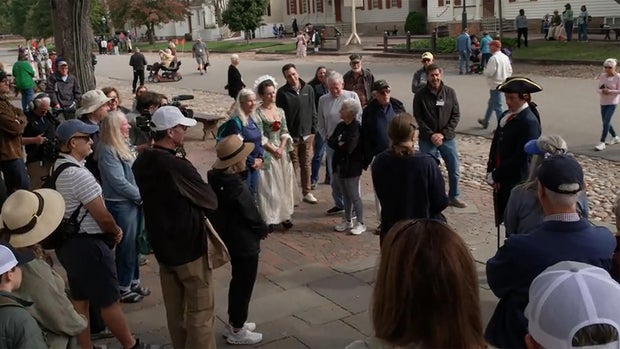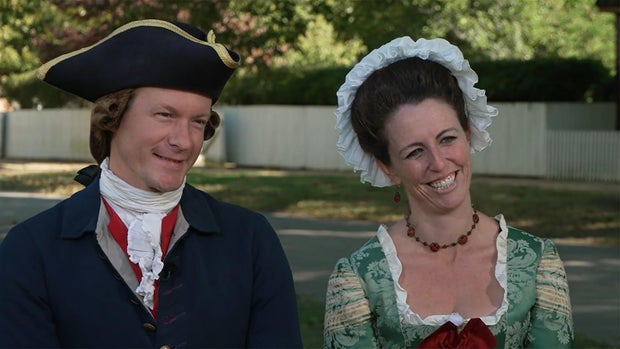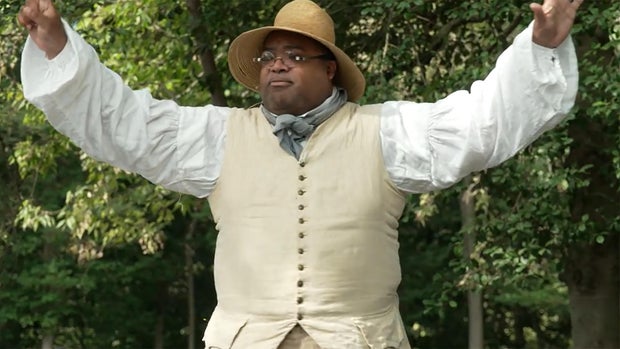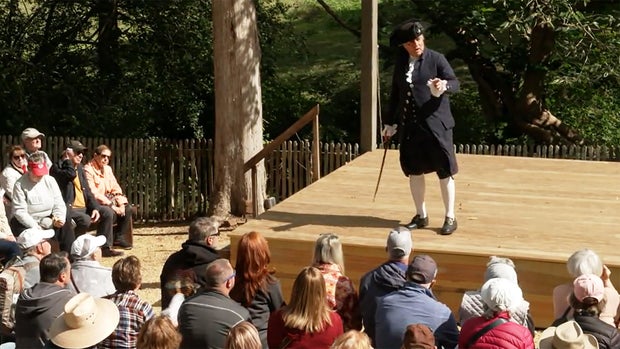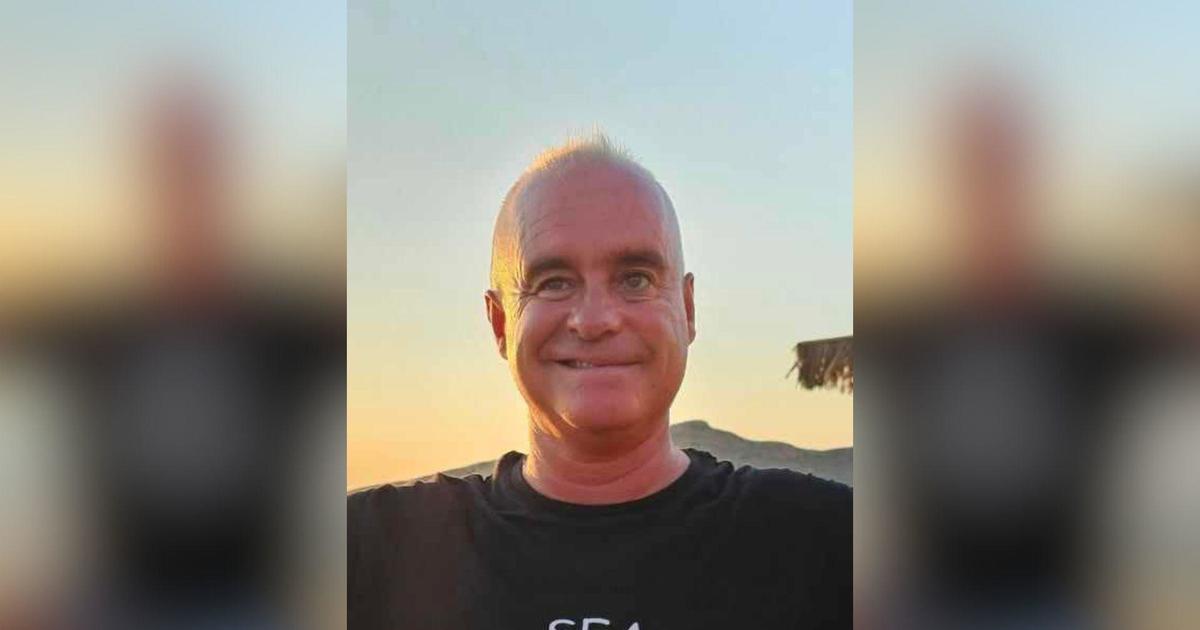[ad_1]
Colonial Williamsburg, capital of the British colony of Virginia, has been preserved as a sprawling museum. Its mission: that “the future may learn from the past.”
The crown jewels of Williamsburg, Virginia, are the interpreters, interacting with audiences of our day, but in the context of the world as they would have known it in their time.
CBS News
By way of example, Thomas Jefferson welcomes visitors: “Good day, friends. How are you faring? You have no complaints? You must not be Virginians! If not from Virginia, where from? Pennsylvania, land of religious anarchy? Welcome! The Ohio Territories? From terra incognito. Welcome to civilization! Upper Canada? Bonjour! Are you immigrating here? Oh, you should. We are trying to encourage immigrants to immigrate here.”
Indeed, immigration was highly controversial in Jefferson’s time, but from a radically different perspective than ours. I raised the issue with Kurt Smith (who personifies Thomas Jefferson), and Katherine Pittman (a very feisty Martha Washington).
“It was there in 1776,” said Smith, “in the Declaration of Independence. You know that middle bit that everyone skips? In the 27 long train of abuses, Jefferson says, ‘He [the king] has prevented immigration.’ It is one of the reasons we declare independence.”
Pittman asked, “And how can we improve if we never welcome anything new?”
“We’re not talking about ‘never’ welcoming anything new,” Koppel said. “We need to know who’s coming. We need to know whether they are people of good character. Isn’t that what the argument is about?”
“It’s the argument in your time,” Pittman said. “We can just speak to our time.”
“Oh, cut it out!”
“You started it!” Pittman laughed.
“I’m in a pissing match with Mrs. Washington, for God’s sake!” said Koppel.
“I think I’m gonna win!” she laughed.
CBS News
The interpreters are well advised to merely hint at the issues of our day. Jefferson (Smith) opined, “How do you get a body of men to vote for something because it’s the right thing to do? I don’t know. Maybe your politicians do it all the time!” The audience was amused.
Visitors to Williamsburg are left to grapple with the actual political problems of 2024. One woman remarked, “There are certain people that want all the power, like the king. They wanted the power over everybody, and I think that’s what’s happening now.”
One young woman said, “This country is steeped in conflict and a fight for liberty. But I truly hope I get to live in a world where I have rights to my body.”
“Abortion,” asked Koppel. “You feel strongly about that?”
“I do,” she replied.
It’s a subject on which Martha Washington also has her own views on, c. 1800. In that era, she said, the issue was dealt with from within the home: “Birth and a woman’s health is a woman’s sphere,” she said. “One does not need to ascertain the services of a midwife if that is the course that you are wishing. These remedies are known amongst female kind. It is known in the indigenous communities. It is known in the African culture. It is known in our European cultures as well, be it different herbs, be it different techniques, in order to rid one’s self of an unwanted child. But generally, they are held within the female sex. But I know that my husband, General Washington, would be in full support of whatever I wanted to do with my own person.”
CBS News
An even more contentious issue, then and now, was race. In Jefferson’s day, that meant slavery. Despite owning more than 600 enslaved men, women and children, Jefferson put forward legislation in 1779 to end the practice. “But here’s the problem,” Jefferson said. “Bill 51, making the slave trade illegal, has to be presented to a body of men, all of whom own … what?”
Williamsburg chooses to depict slavery in a particularly dramatic, and unrepresentative, fashion, in the person of James Lafayette, an enslaved man who was directed to meet with the Marquis de Lafayette, the French nobleman who served the American cause (and whose name James would ultimately adopt).
Lafayette asked James to sneak across the British lines as a fake runaway slave, to ingratiate himself with the officers of the British army, and then report back what he heard. James succeeded so brilliantly that he eventually worked directly under General Lord Cornwallis. “I could take that British intelligence and information and share it with the American side over and over again, which I did,” James said.
He faithfully served the American cause, but he said, “I was not to be given my freedom for what I had done for American independence. I was sent back to slavery. I was sent back to Master William for six more years.”
Only after the Marquis de Lafayette petitioned the Virginia legislature for his freedom would it eventually be granted.
CBS News
Given that extraordinary backstory, I wondered how Stephen Seals (who interprets James) deals with taking on that role. “You understand that so many of the issues that we deal with today are connected to many of the decisions that were made in the colonial area,” Seals said. “You can see the line from one to the other. And when you come to terms and you see that, I got very depressed, and I almost left. I almost quit.”
Then, a colleague reminded him he was giving a voice to ancestors denied one during their own lifetimes. “And the moment she said that to me, I had few issues with the fact that I had to play an enslaved person every single day, because I now understood why I was doing it,” he said. “So, I love what I do, it’s an honor doing what I do, but I live out in the middle of nowhere for a reason, because when I’m done here, I want to go and be away from it all. It’s how I cope.”
Finally, there’s the father of our nation, George Washington. “When we began, I mentioned that we should avoid seeing factions arise,” he said. “I specifically mentioned by regional distinction, but it is just as important that we endeavor to avoid seeing factions arise by the spirit and fury of party politics.”
Asked by a visitor whom he would support in the 2024 presidential race, Washington replied, “I’m not sure what you mean by presidential race, sir. Do you mean the election? Race? Can you imagine how lacking of any sort of virtue or dignity a race would have? We stand for elections, sir; we certainly don’t run for it!”
CBS News
Ron Carnegie gives a striking portrayal of the man who could have been president for life, but chose a different path. “Very often when I’m talking to people at the end, somebody in that group will say, ‘I wish President Washington was running today,'” Carnegie said. “There’s no way a man like President Washington could be president today.”
Because? “He is aloof, he’s not friendly, he’s not outgoing, he doesn’t like to talk in public. And he doesn’t want the job. And how are you gonna become President today if you don’t want the job?”
That wasn’t a problem in 1800. John Adams very much wanted to keep the job; Thomas Jefferson wanted to take it.
Smith noted, “Things are just as nasty in the 18th century as they are in the 21st. There are newspapers that called John Adams pretty awful things. And there were terrible things thrown in Jefferson’s corner. There were New Englanders and New England newspapers that were certain that if Jefferson was elected president, he would personally go into their homes and steal their Bibles.”
John Adams lost that election, and conceded. “Jefferson calls that election of 1800 the Second American Revolution,” said Smith. “And it was precisely because, for the first time in this country, there was a change in political party at the very top of government, and it was peaceful. It was a peaceful transfer of power. That’s powerful.”
That had never happened before, but it set a precedent that lasted – until our time.
For more info:
Story produced by Dustin Stephens. Editor: Ed Givnish.
See also:
